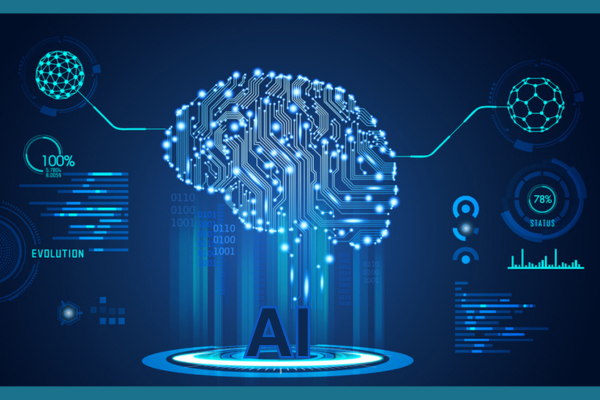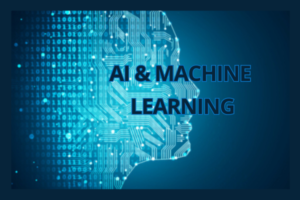
Using AI and ML in crypto trading raises regulatory and ethical concerns. As these technologies evolve, guidelines and regulations must be established to ensure fair and transparent trading practices. Traders and platforms must also consider the ethical implications of using AI and ML in financial markets.These advanced technologies offer powerful tools for analyzing market data, predicting price movements, and optimizing trading strategies. In this blog, we explore how AI and ML are influencing cryptocurrency trading, the benefits they bring, and the challenges they face.
Artificial Intelligence (AI)
AI is the simulation of human intelligence in machines that are programmed to think and learn like humans. It encompasses a broad spectrum of technologies and techniques that enable machines to perform tasks that typically require human intelligence, such as problem-solving, language understanding, and decision-making.
Machine Learning (ML)
Machine Learning is a subset of AI that focuses on developing algorithms and statistical models that allow computer systems to improve their performance on a specific task over time.
Instead of being explicitly programmed to perform a specific task, machine learning systems learn from the data they process.
AI and Machine Learning role in Cryptocurrency
Cryptocurrency trading has undergone remarkable transformations, revolutionizing the financial landscape. Traditional trading methods are being challenged by cutting-edge technologies and novel strategies that streamline processes, enhance security, and provide greater accessibility.
The fusion of blockchain technology with artificial intelligence and machine learning has paved the way for sophisticated trading algorithms that optimize decision-making and mitigate risks. As a result, crypto traders now have access to advanced tools that were once exclusive to traditional markets. Here Is how these technologies are making an impact:
1. Data Analysis and Predictive Analytics
- Market Sentiment Analysis: AI algorithms analyze social media, news, and forums to gauge market sentiment and identify trends that may impact cryptocurrency prices. By processing natural language data, AI can assess the overall mood of the market and predict potential price movements.
- Pattern Recognition: ML models detect complex patterns in historical price data that might be invisible to human traders. These patterns can help forecast future price movements and identify trading opportunities.
2. Algorithmic Trading
AI algorithms can process vast amounts of data in real-time enabling real-time market analysis. These algorithms quickly identify patterns and trends that human traders might miss. For example, they can simultaneously analyze social media sentiment, news articles, and historical trading data to provide a comprehensive market view. AI-driven systems can execute trades automatically based on predefined criteria.
3. Risk Management and Optimization
One key advantage of using AI in crypto trading is its ability to mitigate risks through AI-driven decision-making. AI-powered systems can make more informed decisions by analyzing multiple variables and identifying correlations between market factors.
- Portfolio Optimization: AI and ML tools help traders optimize their portfolios by analyzing risk factors, diversification strategies, and asset correlations. These tools assist in creating balanced portfolios that align with risk tolerance and investment goals.
- Predictive Risk Models: ML models predict potential risks and market shocks by analyzing historical data and market behavior. Traders can use these insights to adjust their strategies and mitigate potential losses.
4. Anomaly Detection and Fraud Prevention
- Detecting Irregularities: AI systems monitor trading activities to detect unusual patterns or anomalies that may indicate fraudulent activities or market manipulation. These systems can alert traders and regulators to suspicious behavior, enhancing market integrity.
- Security Measures: AI-powered security tools protect cryptocurrency exchanges and trading platforms from cyberattacks and hacking attempts. Machine learning algorithms identify and respond to potential threats in real-time.
Advantages of AI and Machine Learning in Cryptocurrency Trading
The integration of AI and ML into cryptocurrency trading offers several advantages:
1. Enhancing speed and Efficiency
- Speed and Precision: AI algorithms can process and analyze large volumes of data at unprecedented speeds, enabling more accurate and timely trading decisions.
- Automation: Automated trading systems reduce the need for manual intervention, allowing traders to focus on strategic decision-making while the technology handles routine tasks.
2. Improved Accuracy
- Data-Driven Insights: AI and ML provide data-driven insights that help traders make informed decisions based on comprehensive analysis rather than intuition alone.
- Predictive Accuracy: Advanced ML models improve the accuracy of price predictions and market forecasts, giving traders a competitive edge.
3. Customization and Adaptability
- Tailored Strategies: AI systems can adapt to changing market conditions and customize trading strategies based on evolving data and trends.
- Personalized Recommendations: ML algorithms provide personalized trading recommendations and strategies tailored to individual preferences and risk profiles.
4. Enhanced Risk Management
Machine learning algorithms analyze historical data to identify potential risks and trends, providing real-time risk assessments and suggesting appropriate strategies.

Challenges and Limitations of AI in crypto trading
Below are some of the dangers of AI in crypto trading:
Volatility: The inherent volatility and uncertainty of crypto markets pose challenges for AI algorithms due to sudden price swings and unexpected events that might lead to flawed trading decisions if these systems aren’t properly calibrated.
Human judgment: A notable limitation is the absence of human judgment in AI-driven trading systems. Factors like sentiment analysis, news events, market psychology, and investor preferences often require a human touch.
Technical complexity: Modern finance is already very complex. Developing and maintaining AI algorithms, processing data, and robust trading systems improves technical expertise and infrastructure.
Over-optimization: Can optimization be too much of a good thing? If we tailor AI algorithms too closely to historical data, they are less adaptable to new or unforeseen market conditions, possibly leading to poor performance.
Data Quality: Data quality is a critical concern because the quality of an AI algorithm’s performance depends on accurate and reliable data. Inaccurate or biased data can significantly impact the performance of AI systems, leading to faulty trading decisions.
Regulatory risk: In May 2023, OpenAI CEO Sam Altman testified before the US Congress, urging lawmakers to consider regulations for AI. The regulatory process for AI is just beginning. How it will affect crypto trading markets remains to be seen.
Regulatory Compliance: The use of AI and ML in trading is subject to regulatory scrutiny. Ensuring compliance with financial regulations and standards is essential to avoid legal issues and maintain market integrity.
Ethical Concerns: The deployment of AI in trading raises ethical questions related to market manipulation, fairness, and transparency. Addressing these concerns is vital for maintaining trust in the financial markets.
System Failures: Reliance on automated trading systems and algorithms introduces the risk of system failures, software bugs, or technical glitches that can lead to significant financial losses.
Market Volatility: AI and ML-driven trading strategies may contribute to market volatility if not managed properly, leading to sudden and unpredictable price swings.
The Future of AI and Machine Learning in Cryptocurrency Trading
Much of the future of AI in crypto trading depends on how crypto regulations evolve. The US Treasury is accepting comments through October on its 300 pages of proposed rules for crypto. If passed as-is, the changes could significantly disrupt US cryptocurrency and DeFi. Advances in deep learning and neural networks will continue to enhance the sophistication and accuracy of predictive models, providing more precise insights into market behavior.
As governments finally bring cryptocurrency under the regulatory umbrella, more mainstream investors will enter the market, and AI applications for crypto trading will likely accelerate rapidly.
The platform automatically aggregates transactions across exchanges and wallets, computes your capital gain or loss, and generates the tax forms you must file yearly. You can also find ways to reduce your tax burden through tax loss harvesting.
As AI and ML continue to advance, they are likely to play an increasingly central role in the future of cryptocurrency trading, driving innovation and transforming the way traders and investors interact with digital markets. Staying informed about these developments and adapting to the evolving landscape will be key to harnessing the full potential of AI and ML in cryptocurrency trading.
